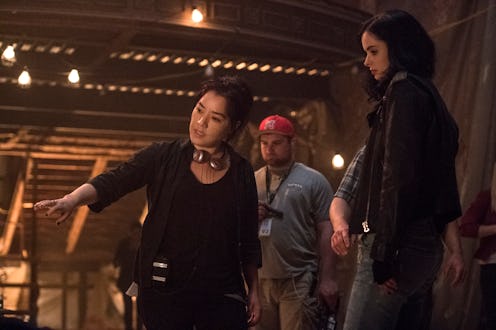Entertainment
For International Women's Day, Netflix Celebrates A Much Needed Side Of TV & Film

It's a time of reckoning in Hollywood, as the #MeToo and Time's Up movements have sparked a conversation about the rampant sexual harassment that exists not only in the entertainment industry, but in every workplace across the country. In Hollywood, the conversation has centered not only on shedding light upon these abusive behaviors, but also on ways that the industry still has a long way to go in terms of equal pay, equal treatment, and equal representation of women of all identities. In a new, Bustle-exclusive Netflix video commemorating International Women's Day, the streaming service emphasizes the importance of representation of women behind the camera, not just in front of it.
This year's Oscar's ceremony featured many moments of triumph for representation of women and femmes in Hollywood. Frances McDormand called upon all female nominees to stand during her acceptance speech and suddenly brought the notion of an inclusion rider to the forefront of national consciousness. The Chilean film A Fantastic Woman, starring trans actor Daniela Vega, won for Best Foreign Language Film, and Vega herself made history as the first transgender presenter in Oscars history. Rachel Morrison did not take home a prize for her work on the film Mudbound, but she broke new ground by becoming the first woman in Oscars history to be nominated for cinematography, ever.
And yet, the awards also revealed how much work is still to be done in order to achieve some semblance of equality, particularly for women working behind the camera. Lady Bird creator Greta Gerwig's nomination for Best Director was the first time a woman had been nominated in that category since 2010. Only five women have ever been nominated for Best Director in Oscars history, and Kathryn Bigelow is the only woman to ever take home the prize, for her work on The Hurt Locker. The fact that Morrison was the first woman ever nominated for cinematography is simultaneously a triumph and a disheartening reality check about not only about the lack of female-centric stories, but the lack of women creating, envisioning, styling and directing those stories.
Netflix's commemorative video for International Women's Day, made exclusively for Bustle, emphasizes the fundamental importance of championing women's work behind the camera, with the hopes that female directors and writers and cinematographers and more will no longer be a rarity. With the taglines "Stories About Women," "Stories Told By Women," and "Stories Made By Women," the video celebrates the work of female actors, writers, directors, producers, cinematographers, and creators that have contributed to many of the incredible shows and movies that have made Netflix such a success.
Check Out The Video Below:
Netflix isn't just talking the talk. The second season of the Netflix original Jessica Jones was directed exclusively by women. The film Mudbound not only featured groundbreaking cinematographer Rachel Morrison, but also a black and openly gay female director, who also became the first black woman ever nominated for Best Adapted Screenplay at the Oscars, Dee Rees. Netflix's Oscar-nominated documentary short, "Heroin(e)", was directed and produced by Elaine McMillion and featured the stories of three women in West Virginia working to combat the opioid crisis. And the hit series Grace & Frankie and Orange Is The New Black not only revolve around women's stories, but were created by women—Marta Kauffman and Jenji Kohan, respectively. Netflix honored and named each of these women in the video, making sure that they received the recognition so often more readily afforded to their male colleagues in the same fields.
But while these women should receive accolades, there is still more work to be done. According to the annual "Celluloid Ceiling" report conducted by the Center for the Study of Women in Television and Film at San Diego State University, of the top 250 domestic grossing films of 2017, women made up only 18 percent of all directors, writers, producers, executive producers, editors, and cinematographers working on those projects. Alarmingly, the report states that this number represents only a one percent increase from 2016, and is "virtually unchanged" from the percentage found by the same study in 1998.
The study also found that of these 250 films, 88 percent had no female directors, 83 percent had no female writers, 45 percent had no female executive producers, 28 percent had no female producers at all, 80 percent had no female editors, and 96 percent had no female cinematographers. The percentage of female writers has actually decreased by two percent since 2016, now accounting for only 11 percent of the writers of the 250 top-grossing films of 2017.
These numbers are abysmal, and show that the industry has a long way to go before women are as common, respected, and lauded as visionaries behind the camera as men are. And, as films such as Lady Bird and Mudbound prove, there is not only creative value in having women, and women of diverse identities, in charge of stories about women, those projects are just as popular as those created by men. Lady Bird was perhaps the most universally beloved movie of the awards season. And, director Patty Jenkins' wildly successful Wonder Woman proved that women can make and star action movies as well as men.
So women have proven that their work can be as beautiful, moving, funny and lucrative as any work by a man. There is still work to be done to improve female representation behind the camera, especially for women of color and diverse sexual orientations. But the time to begin that work is now. After all, white men have been telling stories about white men for centuries. Now, it's their turn to watch, and listen, and learn.